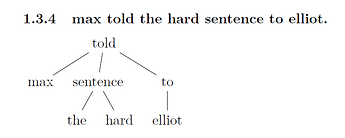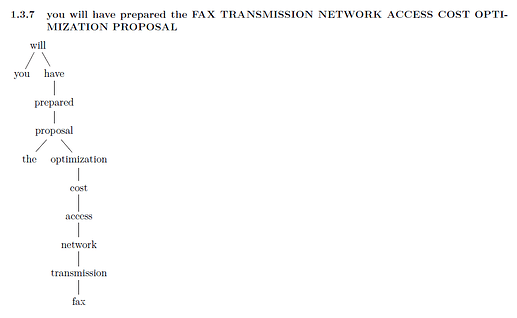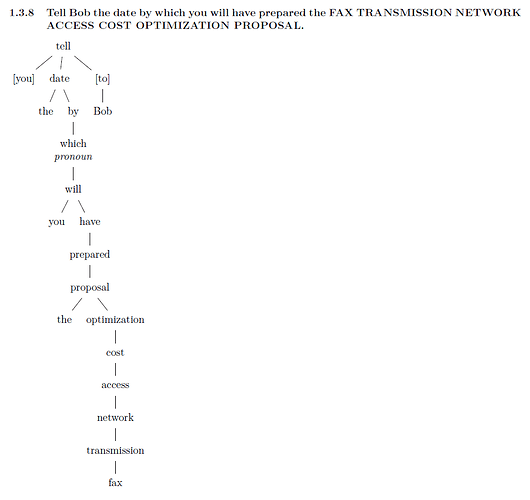Continuing the discussion from Grammar tree analysis of two paragraphs from Atlas Shrugged:
Topic Summary: I made up a sentence that I think will be hard to analyze and documented my process of breaking it down into a grammar tree.
The sentence has multiple chained aux verbs and incorporates the attributive noun example from the above post (for fun). After starting and getting stuck with my usual method, I started to break down the problem and thought it’d be good to document my process.
Goal:
- do a hard grammar tree
- expose thinking methods to criticism
- contribute to community resources WRT grammar stuff
CF relevance: grammar, problem solving, judging own errors
Do you want unbounded criticism? (A criticism is a reason that an idea decisively fails at a goal. Criticism can be about anything relevant to goal success, including methods, meta, context or tangents. If you think a line of discussion isn’t worth focusing attention on, that is a disagreement with the person who posted it, which can be discussed.)
Yes
Note: these notes are pretty rough. The lines starting with “–” are individual thoughts i had or steps i made, etc.
sentence 1:
tell Bob when you will have prepared the FAX TRANSMISSION NETWORK ACCESS COST OPTIMIZATION PROPOSAL by.
– hmm, a bit hard to see overall structure, words are mb out of order
– try rewriting (particularly WRT “by”)
sentence 2:
Tell Bob the date by which you will have prepared the FAX TRANSMISSION NETWORK ACCESS COST OPTIMIZATION PROPOSAL.
– too hard, not sure how to break down
– simplify: don’t have an imperative, use a simple sentence.
sentence 3
max told elliot the hard sentence.
– still not sure – ‘Elliot’ and ‘the hard sentence’ are both nouns
– simplify: very simple sentence
sentence 4
max told elliot.
– that’s easy
– I notice that I could have written ‘max told the story’ (or something like that) which has a different meaning/use of told
– rewrite sentence using this other meaning
sentence 5
max told the hard sentence to elliot.
– is this correct/equiv?
– searched “grammar verb 2 objects”
– found Double object verbs → direct/indirect object
– fi/grammar – indirect objects have implied “to”, “for”, etc.
– cool, matches what I had earlier and makes sense
sentence 5
max told the hard sentence to elliot.
[told [max] [sentence [the] [hard]] [to [elliot]]]
sentence 3
max told elliot the hard sentence.
[told [max] [sentence [the] [hard]] [{[to] \\ implied prep.} [{elliot \\ indirect object}]]]
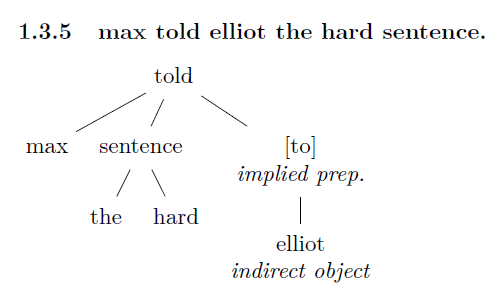
– looks okay, try structure of sentence 2
sentence 6
Tell X Y.
[tell [{[you] \\ implied (imperative)}] [Y] [{[to]} [X]]]
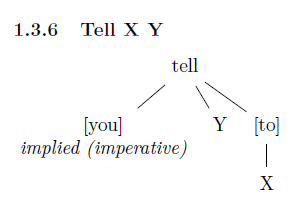
– not sure I’ve done a grammar tree of an imperative sentence before
– this seems okay
sentence 2
Tell Bob the date by which you will have prepared the FAX TRANSMISSION NETWORK ACCESS COST OPTIMIZATION PROPOSAL.
[tell
[{[you]}]
[date
[the]
[by
[{which \\ pronoun}
[CLAUSE]
]
]
]
[{[to]} [Bob]]
]
– hmm, what is ‘which’? seems like a pronoun/prosentence + ref but not sure WRT usage with “by”
– “when” could be used similarlly: tell me when you’ve done the thing.
– define: when → merriam-webster: pronoun “what or which time”
– sounds good; concluding that ‘which’ is a pronoun here
– let’s do CLAUSE independently, first:
sentence 2a
you will have prepared the FAX TRANSMISSION NETWORK ACCESS COST OPTIMIZATION PROPOSAL
[will
[you]
[have
[prepared [proposal [the] [...]]]
]
]
– all of “FAX TRANSMISSION NETWORK ACCESS COST OPTIMIZATION” is modifying proposal, but is it one modification or multiple?
– depends on what’s been said; and multiple diff combinations could work? but they’re all nouns
– too hard, go back to what Elliot wrote (the source of this part of the sentence)
– attributive noun (didn’t rly remember this from reading elliot’s post this morning, but did remember the example b/c it seemed like an interesting thing to analyze)
– also reminds me a bit of hyphenated / compound words
– the word order matters, a ‘cost access optimization transmission network fax proposal’ doesn’t work
– the proposal is about an optimization, so that’s the only child of proposal
– the optimization is about the cost of ‘fax trans. network access’
– could group like: (fax trans.) (network access) or (fax trans. network) (access)
– the cost is particularly for access (or network access, but that would be [access [network]]), so access is under cost
– the network is about ‘fax trans.’
– fax is modifying the type of transmission (rather than ‘transmission’ describing the fax)
– so grouping seems to be like ((((((fax) transmission) network) access) cost) optimization)
– [optimization [cost [access [network [transmission [fax]]]]]]
– that seems pretty orderly (all nodes have 1 child); do attributive nouns always group like this or are more complex trees possible? mb with more complex trees you need commas or conjunctions? in any case, not relevant atm
– another idea, rewriting: the proposal for the optimization of the cost of access to the network for the transmission of faxes. seems consistent with grouping above ![]()
– let’s do sentence 2a
sentence 2a
you will have prepared the FAX TRANSMISSION NETWORK ACCESS COST OPTIMIZATION PROPOSAL
[will
[you]
[have
[prepared [proposal [the] [optimization [cost [access [network [transmission [fax]]]]]]]]
]
]
– cool, now the full tree:
sentence 2:
Tell Bob the date by which you will have prepared the FAX TRANSMISSION NETWORK ACCESS COST OPTIMIZATION PROPOSAL.
[tell
[{[you]}]
[date
[the]
[by
[{which \\ pronoun}
[will
[you]
[have
[prepared [proposal [the] [optimization [cost [access [network [transmission [fax]]]]]]]]
]
]
]
]
]
[{[to]} [Bob]]
]
– guess regarding sentence 1: the preposition on the end is out-of-order and implies something like sentence 2
– not going to do sentence 1 atm, maybe later
